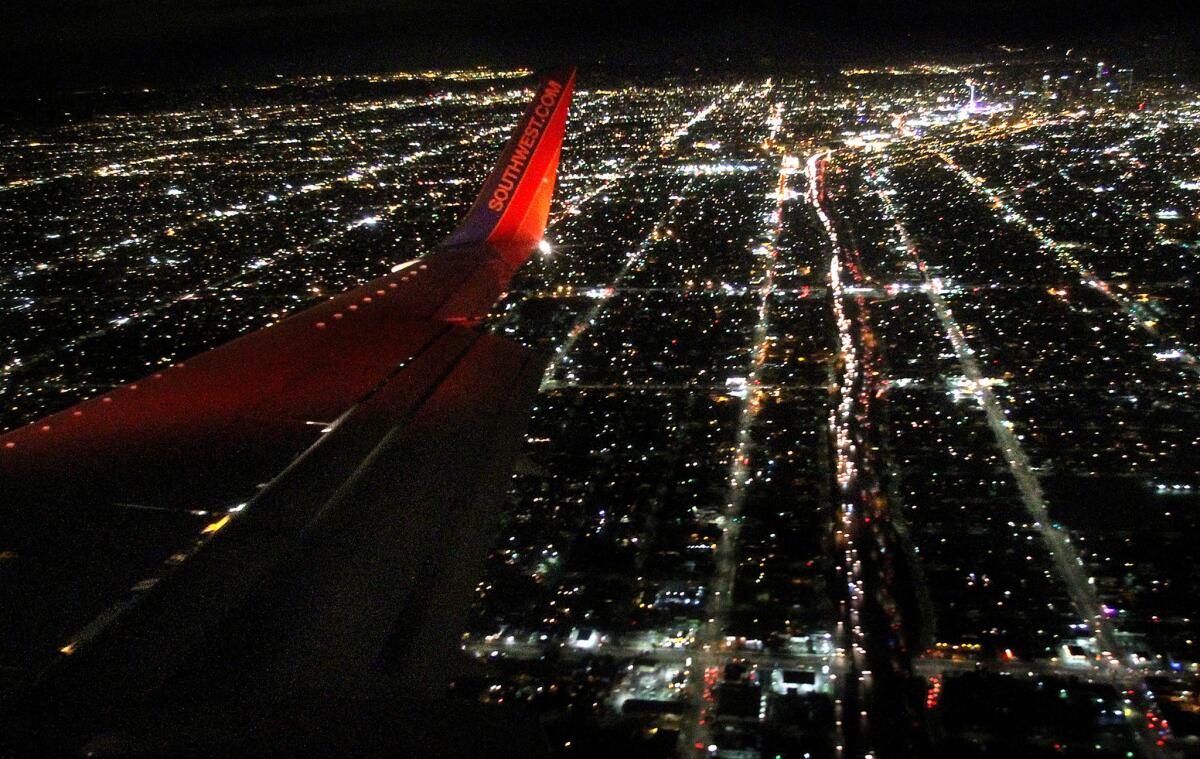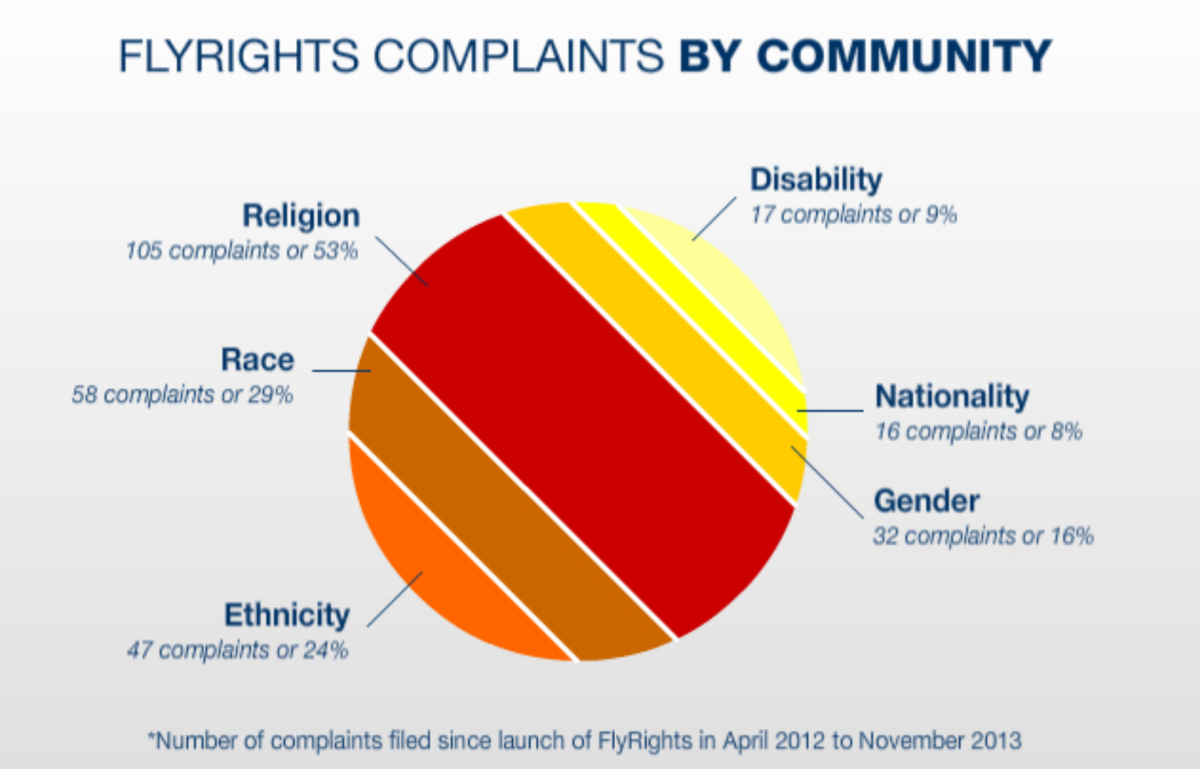It’s time for airlines to stop ejecting passengers for looking or acting Muslim

Southwest has barred two Muslim passengers from flights in recent days after they were thought to be acting strangely. Here, a Southwest jet approaches LAX in 2013.
- Share via
There isn't much that one can say conclusively about incidents in which passengers have been removed from airplanes because someone they were looking or acting in a menacing way except for these points:
—A large number of them involve individuals or groups acting like or appearing to be Muslims or Arabs.
—The people making a to-do about them are almost invariably permitted to continue on their merry way unmolested.
—The passengers ejected as a results of these complaints are typically found to be harmless — after they've been questioned by law-enforcement authorities and forced to miss their flight.
—Often the clearest cases of misbehaving passengers involve not Muslims, but white males behaving as if the rules of civilized behavior aboard commercial aircraft apply to everyone except themselves. Often they're dressed in such tribal garb as a backwards baseball cap.
That's not to say that groups of passengers of any type may not act disruptively, only that the bar for ejecting passengers seems to have gotten alarmingly low when the target is, or appears to be Muslim or Arabic.
We wouldnt remove passengers from flights without a collaborative decision rooted in established procedures....Southwest neither condones nor tolerates discrimination of any kind.
— Southwest Airlines
The most remarkable thing about all such incidents is that, after roughly 15 years of terror in the skies, the airlines still seem unable to apply consistent rules when one passenger or a crew member decides that another is making him or her "uncomfortable."
Here's Southwest's official statement after two separate incidents in which Muslim passengers were removed from flights at Chicago's Midway airport in November: “We wouldn’t remove passengers from flights without a collaborative decision rooted in established procedures...We regret any less than positive experience onboard our aircraft.…Southwest neither condones nor tolerates discrimination of any kind.”
Plainly, that's no longer enough. Southwest and its fellow air carriers need to have better procedures for assessing threat levels aboard their aircraft, and dealing with passengers who demand that other passengers be barred from flying based on hunches, perceived discomfiture or pure imagination. (Southwest hasn't responded to my request for further comment.)
The urgency is ever greater because after a brief period of quiescence, demands for the removal of Muslim passengers seems to be on the rise. The reasons are debatable, but they just may have something to do with the targeting by certain presidential candidates (they know who they are, and so do you) of Muslims, Syrians or Arabs as potentially dangerous terrorists deserving to be barred from the United States entirely.
A Maryland woman says she was removed from a Southwest plane last week after she tried to switch seats with a neighboring passenger; the flight attendant who reportedly ordered her off said she was not "comfortable" by the passenger. And UC Berkeley senior Khairuldeen Makhzoomi says he was removed from a Southwest flight from LAX to Oakland on April 6, subjected to questioning by security officers, and barred from replaning after he was overheard speaking Arabic before the flight.
As long as the airline and security authorities remain mum, it's impossible to know whether there was any reason beyond the crew member's or fellow passengers' nerves to warrant removing these customers from the aircraft. But in the majority of such reported cases, the targeted passengers are eventually released. Statistics on discriminatory treatment are murky, in part because the nature of the discrimination or its perpetrator is often unclear.

Whether they're allowed to continue their travel on the original airline depends on the airline. Makhzoomi wasn't charged with anything by authorities at LAX, but nevertheless Southwest refused to allow him to take another flight, according to a spokeswoman for the Council on American-Islamic Relations. She said he had to take a Delta flight to the Bay Area instead. By contrast, AirTran apologized in 2009 for removing nine Muslim Americans from a Washington-Orlando flight, refunded their tickets and provided them with free return airfare in an episode that started when neighboring passengers became alarmed at their conversation.
Paranoia about Muslim-appearing passengers erupted after 9/11. The most celebrated case was launched in 2004 by a writer named Annie Jacobsen, who said she was aboard a Northwest flight from Detroit to Los Angeles when a group of passengers began acting strangely and, in her view, alarmingly. The 13 dark-skinned passengers wore track suits with Arabic lettering, socialized with one another in the aisle, and spent inordinate periods in the bathroom.
Jacobsen chronicled all this with what air travel blogger Patrick Smith, a pilot, called "mindless hysterics and bigoted provocation." The truth was that the passengers were members of a Syrian musical group booked to perform at the Sycuan casino resort. The Department of Homeland Security, which examined how air-safety officials handled the incident, didn't think that any officials involved handled it well, but acknowledged that no one had turned up evidence that the passengers represented a threat.
The paranoid anti-immigrant atmosphere being stirred up during this electoral season has put more pressure on airlines and security officials to treat all passengers fairly. One passenger's assertion that another makes him or her uncomfortable shouldn't be enough to target a stranger; why not offer the complaining passenger the opportunity to change his or her flight?
What's been forgotten in many of these incidents is the principle once set down by the late Alfred Khan, who as chairman of the Civil Aeronautics Board deregulated the airlines in the 1970s. As I remember it (I can't find a formal account), Kahn, a professor at Cornell, related how a well-heeled friend of his complained that under deregulation, he had been forced to set next to a scruffy hippie on a flight. Kahn told his friend, "He probably didn't think much of you, either."
[Updated: Reader RG points me to some published versions of the above quote from Kahn, which I misremembered. In one published version, the complaint came from conservative economist Irwin Stelzer, who complained of having had to sit next to a "hippy." Kahn replied, "Since I have not received any complaints from the hippy, I assume the distaste was not reciprocated." In a second version, from an obituary in the journal Regulation, Stelzer complained about having been seated next to a “hippie, who obviously hadn’t bathed in months and undoubtedly paid a much lower fare.” Kahn replied, "Dear Dr. Stelzer: I have before me your complaint about your recent experience.... Before taking any action, we are waiting to hear from the hippie."]
Keep up to date with Michael Hiltzik. Follow @hiltzikm on Twitter, see his Facebook page, or email [email protected].
Return to Michael Hiltzik's blog.
UPDATES:
5:34 p.m.: This post has been updated with fuller versions of the anecdote featuring Alfred Kahn.
Sign up for The Wild
We’ll help you find the best places to hike, bike and run, as well as the perfect silent spots for meditation and yoga.
You may occasionally receive promotional content from the Los Angeles Times.




